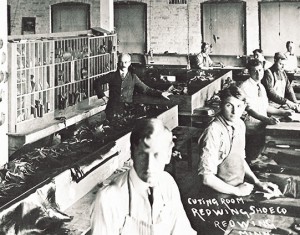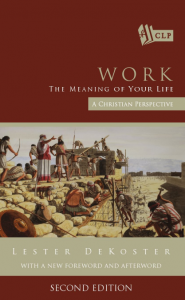 Can something as simple as a shoe build civilization?
Can something as simple as a shoe build civilization?
I recently had the pleasure of touring the Red Wing Shoe Museum in Red Wing, Minnesota, home of the Red Wing Shoe Company, and the answer became quite clear.
Founded in 1905, Red Wing Shoes has from the very beginning focused on producing boots and shoes for those who “work on their feet.” At a time when blacksmiths, carpenters, lumberjacks, and farmers had few options for footwear, founder Charles Beckman grew frustrated with the status quo, and responded by building “purpose-built” footwear to meet the needs of manual laborers.
Their slogan: “Work is our work.”
The company quickly gained a reputation for high-quality shoes and boots, and still maintains its status as a premier shoemaker for specific trades, supplying footwear for everyone from snake handlers to skyscraper builders to oil rig workers to restaurant chefs. Although most of us wouldn’t think to look at the feet of those who provide such services, the company continues to quietly empower labor of all kinds across the world.
When celebrating the work of others, it can be easy to focus on the big-picture, consumer-centric outputs — the services rendered, the products created, the minerals mined, the buildings constructed, etc. But behind these efforts are countless other components supported by countless other workers with profound creative potential — each striving to meet the other’s needs through innovation, entrepreneurship, hard work, and basic economic exchange.
 As Lester DeKoster writes in Work: The Meaning of Your Life:
As Lester DeKoster writes in Work: The Meaning of Your Life:
The fabric of civilization, like all fabrics, is made up of countless tiny threads — each thread the work of someone…We are daily providing the threads which join with innumerable others in making civilized life possible. Consider…the furniture around you. It’s congealed work—and worker. Countless hands fashioned it all along the way from raw material to finished product. Our homes are furnished because there is a tightly woven fabric of civilization, or there would be no chair, no sofa, no table, and no car, no street, nothing at all. What civilizes our world is the fact that work is done.
Somewhere in the whole mosaic of goods and services our work is being done too. My chair would be no more useful were it autographed by every hand that gave something to its creation! I can use it simply because everyone did their job… The mosaic of culture, like all mosaics, derives its beauty from the contribution of each tiny bit.
The products offered by companies like Red Wing Shoes are indeed but one “tiny bit” of that beautiful and mysterious mosaic of collaboration, and yet the effort and artistry invested therein is so remarkable to behold in and by itself. As I walked through the museum, I read numerous encased thank-you letters from happy customers — workers whose lives and labor were made easier, safer, and more productive thanks to the simple contribution of a shoemaker.
Consider the following:
Here we see the deeper meaning of our work and its profound role in building civilization and a flourishing society. The craftsmanship that goes into these shoes is important and astounding, as are the tangible products and services it contributes to. These features are easy for us to understand — to see, to smell, to wear on our feet.
 What’s easier to forget is the powerful role of basic exchange in connecting this with that, and the human collaboration that takes place as a result.
What’s easier to forget is the powerful role of basic exchange in connecting this with that, and the human collaboration that takes place as a result.
As Stephen Grabill notes in Episode 3 of For the Life of the World, the fruit of our work goes well beyond the products we create. In the end, this about relationship with others:
Our work is not just toil, or something that concerns just us. It’s something that creates a huge organic mass of relationships between human persons… So when we talk about the fruit of that tree, what is it? The fruit of that tree and all of our creativity is not only products, but relationships…The fruit of our labor is fellowship. It’s community…This is the oikonomia of economics…All our work, every product, is a result of a great and mysterious collaboration.
As we proceed with our daily work and as we consider our callings and vocational directions, moving to participate, collaborate, and innovate within this web of human relationship that we call “the economy,” let us appreciate the contributions of each “tiny bit” — with gratitude and esteem and the creative response God has planted in each of our hearts and hands.
For more examples of how Red Wing Shoes contribute to the work of others, watch any number of videos on the subject.
For more on Episode 3 of For the Life of the World, see the trailer below.


